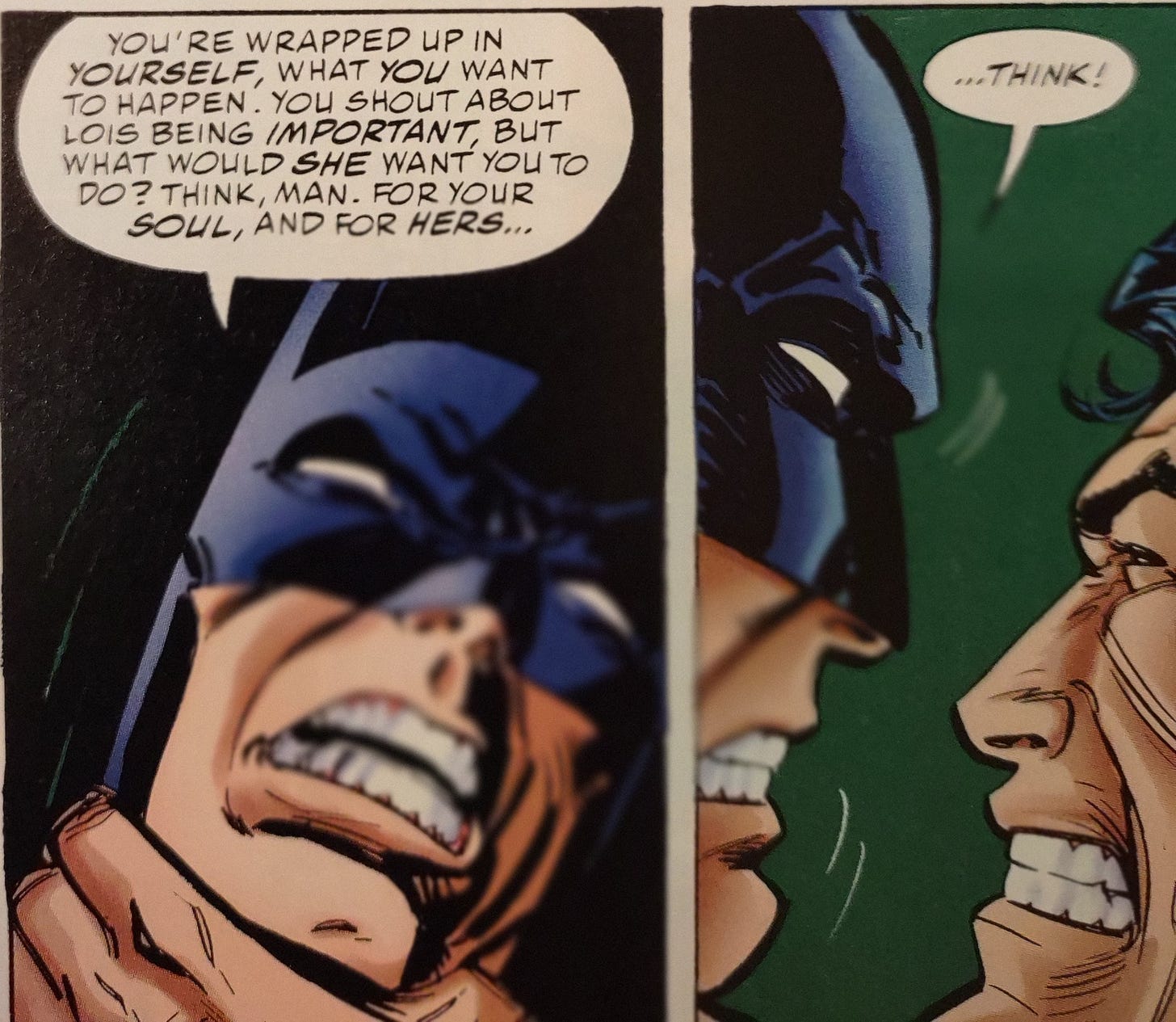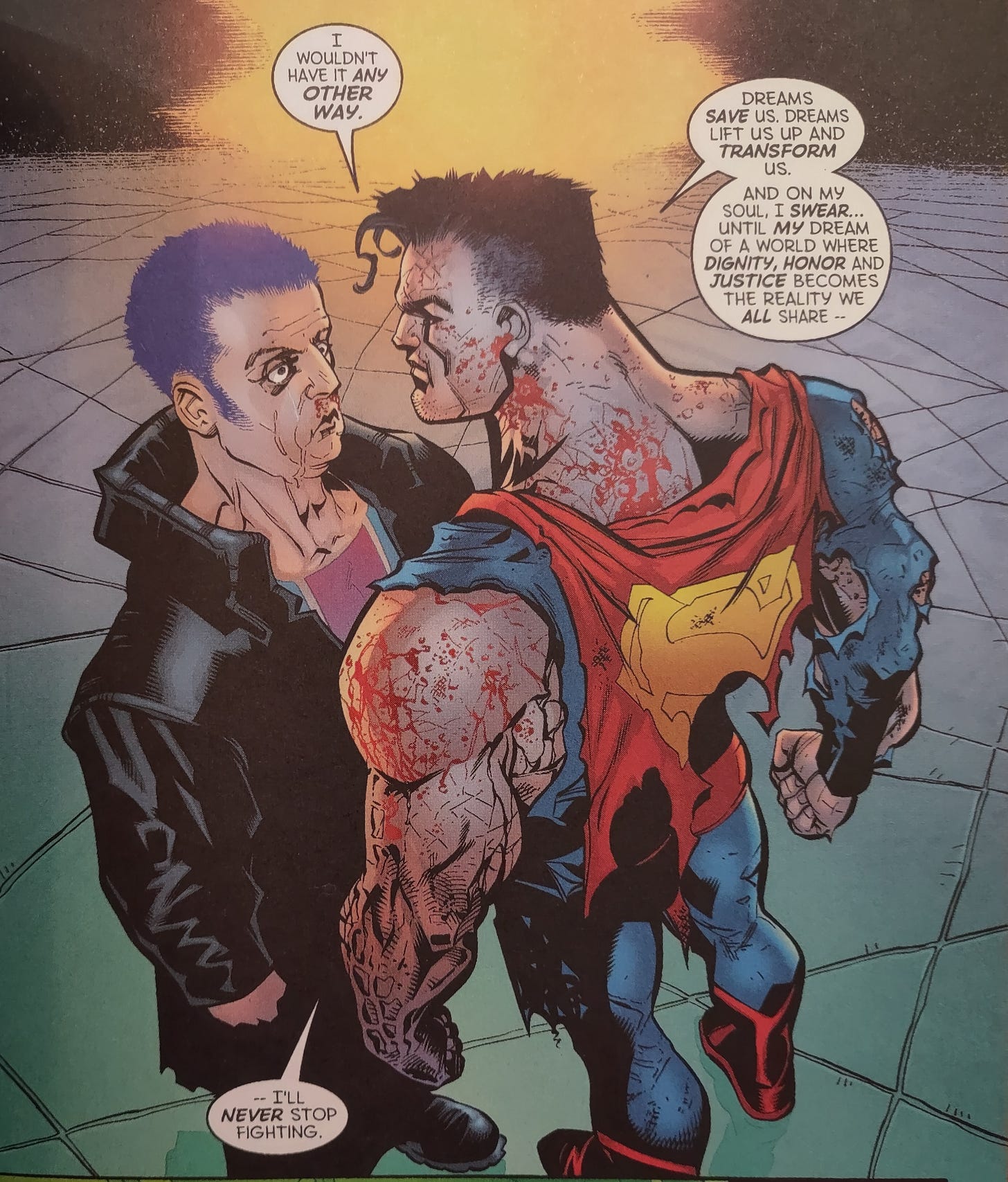The Wrong Way to Show a No-Killing Rule
A '90s Superman comic follows the letter of the law but not the spirit.
Superman should never kill. Once he kills anyone, even the worst villain, he stops representing the best of us and no longer qualifies as Superman.
It’s important to show this rule correctly, though. A 1981 Superman novel did. A comic book from 1996 did not.
In Action Comics #719, the Joker attempts to get revenge on Superman by poisoning Lois Lane. But, being the Joker, his plan doesn’t stop there. He doesn’t want to merely hurt Superman—he wants to destroy him. The only way to save Lois is by injecting the Joker with the same poison and using the resulting antibodies as a cure. Naturally, the poison would kill the Joker.
This creates an impossible dilemma for Superman: Does he kill the Joker or let Lois die?
In a proper Superman story, he would do neither. He wouldn’t play the Joker’s twisted game, and he’d figure out some other way to save Lois, no matter what great lengths he had to go to, no matter how little time he had to do it. Because he’s Superman.
Alas, in this comic, Superman chooses to let Lois die.
She doesn’t die, of course. That’s part of the “joke”—the poison was never going to actually kill her, so Superman would have slain the Joker for nothing.
The comic gets the Joker right, and his plan almost works. Superman is tempted to kill him, if that’s what it takes to save Lois. Batman, however, convinces Superman that such thoughts are selfish, and that Lois wouldn’t want him to kill anyone for her benefit, not even the Joker.
On the last page, when Lois learns that Superman was standing idly by as she was “dying,” she’s a bit unsettled and uncertain. She tries to understand, though. When she breaks off their engagement shortly later in the series, this is not the main reason.
The comic, then, doesn’t portray Superman’s decision as self-evidently correct, but it appears to lean in that direction.
One thing is correct: Superman should never kill the Joker.
But the other side of the equation is equally important: Superman should never let Lois Lane die.
The Superman of 1996 was well past the point of being able to rewind time by reversing the Earth’s rotation. This era featured a much more down-to-earth Superman. But he was still Superman.
So how do we fix this story? First of all, the Joker is too purely evil to fit into this ethical dilemma. He’s a poor choice for demonstrating the value of each individual life. He can still arrange the whole thing, but in DC Comics, anyone can have a rare blood condition that would allow them to produce the necessary antibodies.
So let’s say that person is a lesser, ordinary criminal—someone who’s not a good guy, but he’s not a killer and he’s not irredeemably evil. This criminal is someone we can still empathize with as a human being who has intrinsic worth despite his terrible life choices, someone who has loved ones or even just a single loved one.
It would clearly be wrong to kill this guy, since he, too, would be an innocent victim in this particular scenario. We don’t get to decide that his life is worth less than someone else’s, and Superman especially doesn’t.
But Superman still needs to find a way to save Lois. He needs to save both lives.
A few options spring to mind:
1.) He can learn of a rare element that would heal Lois, but it’s deep in space, near more than a few dangerous alien threats. Superman runs this gauntlet, securing the element in the nick of time, saving Lois without having to kill anyone.
2.) He recruits the Atom’s help, and they save Lois Fantastic Voyage–style.
3.) He recruits Dr. Fate’s help to acquire a magical cure, one that poses tremendous risk to Superman since he’s vulnerable to magic. But he prevails despite the hardship.
And there’s probably an even better option. But whatever the solution, Superman avoids killing anyone and he actively saves Lois, because that’s the kind of hero he is.
A Better Example
In thinking about this issue, I remembered a much better comic that came out in 2001, one of the best single-issue Superman stories of any era. Action Comics #775, titled “What’s So Funny About Truth, Justice & the American Way?,” shows us why Superman should never go out of style.
A new team of powerful superhumans appears. They call themselves the Elite, and to get the job done, they’ll kill the bad guys and any innocent bystanders who happen to be within range, so long as the larger threat is eliminated, permanently.
Superman’s not having that. As the public begins to wonder if maybe there’s some validity to the Elite’s approach, Superman realizes it’s up to him to show the world there’s a better way.
What makes Superman cool isn’t his powers; it’s how he uses them and how he’s able to restrain himself despite possessing all that power. He doesn’t force his will on others or try to seize more power for himself. He leads by example, with physical force being the last resort. He always operates within clearly set parameters. It would be too easy for him to cross any number of lines, so he doesn’t. Most others would give into the temptation, but he’s strong enough to control himself.
In this issue, he’s not only trying to stop the Elite from killing people, but he’s also standing up for ideals—and he’s standing up to people who are seemingly more powerful than even he is.
“Dreams save us. Dreams lift us up and transform us. And on my soul, I swear… until my dream of a world where dignity, honor and justice becomes the reality we all share — I’ll never stop fighting. Ever.”
There’s a reason Superman is the greatest superhero ever created. He’s a role model for kids and adults alike, and he demonstrates values that should never go out of style, no matter how times change.
In order for the character to remain relevant, though, he can’t just not kill—he needs to save lives.







I admit, I'm not the biggest Superman fan, but this was an excellent breakdown of the character and what makes him great. No matter what, Superman is always active in his pursuit of justice, not an idle bystander.
Oooh, I need to read Action Comics #775 when I get the chance!